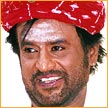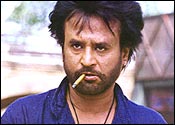
|
No water, no film
Resident Tamilians thirsty for native entertainment in Bangalore
|
M D Riti in Bangalore
After years of seeing one or two Tamil films a week, the 15,000 Tamilians living in Bangalore feel as parched as the drought-stricken. Thanks to the Cauvery water dispute and the Tamil film industry getting involved in it, the Kannada film industry has banned the screening of Tamil films in Karnataka since October 4.
It is not just the viewers who are in distress. Tamil film exhibitors in Karnataka are having a harder time.
There are about 30 theatres earmarked for Tamil films all over the State. Tamil filmmakers have been making about Rs 150 million through the screening of their films in Karnataka every year. The Karnataka Tamil Films Distributors' Association has made a fervent appeal tor the Prime Minister to intervene and solve this crisis.
The Kannada film industry took this firm stand after Tamil film director Bharathiraja said, at a press conference in Chennai last month, that the Neyveli Lignite Corporation should stop giving Karnataka electricity. Two major dharnas held in Chennai by the Tamil film industry over the Cauvery issue --- a dharna and a hunger strike by Rajanikant --- further worsened the situation. So did film star turned MP Ambareesh's move to resign from his post when Karnataka released water to Tamil Nadu.
Sporadic attempts to break this stalemate proved quite disastrous. Some irate Kannada chauvinists broke into a tent that was screening Rajanikant's latest film Baba and damaged the screen, the projection equipment and even the seating area of the makeshift hall. They even hit the owner of the tent on the head and set fire to his scooter.
Meanwhile, some cable operators, unable to withstand the wrath of their numerous viewers who enjoyed watching Tamil television serials, began telecasting Tamil channels again a couple of weeks ago in a clandestine manner. ICE network of Rajajinagar even telecast the screening of an old Rajanikant film Padayappa.
However, the Kannada activists got into the act within hours and had the channels closed down again quickly enough. "All this has happened when we were arrested and taken to Bellary jail for our involvement in Cauvery water dispute agitations," says Kannada activist Janagere Venkataramaiah. "The operators thought it would be 15-20 days before we were able to come out from jail."
Adds B Suresh, Secretary, Karnataka Television Association, "Some of the Tamil Sangas had tried to open Tamil channels through Karnataka Information Minister Kagodu Thimmappa but he did not give in."
As for the Karnataka Film Chamber itself, its office bearers continue to maintain the stand that nobody has officially asked for a ban on Tamil films and channels. The ban, they say, is entirely self-imposed, and will last until the Supreme Court gives its verdict.
 This ongoing impasse certainly seems sad, given the long and pleasant association between the Karnataka and Tamil Nadu film industries. Kannada mega star Rajakumar himself had made his home with family in Chennai years ago, simply because most Kannada films were processed in Tamil Nadu [due to lack of good editing studios and sound labs in Bangalore earlier]. He shifted back to Bangalore only 25 years ago.
This ongoing impasse certainly seems sad, given the long and pleasant association between the Karnataka and Tamil Nadu film industries. Kannada mega star Rajakumar himself had made his home with family in Chennai years ago, simply because most Kannada films were processed in Tamil Nadu [due to lack of good editing studios and sound labs in Bangalore earlier]. He shifted back to Bangalore only 25 years ago.
Some of the Tamil film industry’s leading stars were, of course, from Karnataka. Chief minister Jayalalitha herself comes from Mysore, although she never acted in Kannada films. Reigning superstar Rajanikant grew up in the bylanes of Hanumanthanagar in Bangalore and worked as a bus conductor before he moved to Chennai.
Several popular Kannada film stars, like V Ravichandran and G Ramesh, are Tamilians by birth. Ravichandran’s father N Veeraswamy, the man who produced many of Rajakumar’s films, was a Tamilian too.
There have been spats between Kannada and Tamil films on occasion. There was a time when M G Ramachandran’s posters could be papering all the walls of some of Bangalore’s Tamil pockets like Vivekanagar and Srirampuram. Kannada film fans would occasionally despoil these.
When Rajakumar went to Ooty in the 1980s for the shooting of one of his last films Yaarivanu, some Tamilians attacked him. His fans retaliated by venting their wrath on posters of popular Tamil film stars and films in Karnataka.
When Veerappan kidnapped Rajakumar two years ago, Tamil channels were taken off the air for a while. The whole Kannada film industry also came to a stop for many weeks.
At all such times, the real beneficiary is the Bollywood film industry. Hindi films already do brisk business in Bangalore and even elsewhere in Karnataka. The shenanigans of the local film industries might well drive even the remaining viewers into the fold of Hindi cinema.